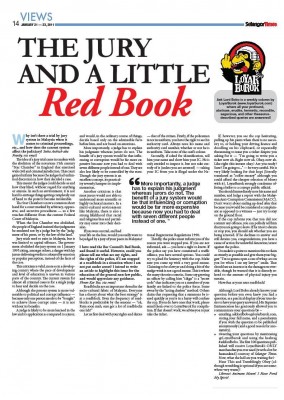 From the Selangor Times Issue 9, 21-23 January 2011. Ask Lord Bobo is a weekly column by LoyarBurok where all your profound, abstruse, erudite, hermetic, recondite, sagacious, and other thesaurus-described queries are answered! You can view the entire paper at the end of this post, and download a pdf of the entire paper here.
From the Selangor Times Issue 9, 21-23 January 2011. Ask Lord Bobo is a weekly column by LoyarBurok where all your profound, abstruse, erudite, hermetic, recondite, sagacious, and other thesaurus-described queries are answered! You can view the entire paper at the end of this post, and download a pdf of the entire paper here.
This week, Ask Lord Bobo explains why there are no jury trials in Malaysia, and what you should do at your next police roadblock.
Why isn’t there a trial by jury system in Malaysia when it comes to criminal proceedings, etc., and how does the current system affect the judiciary? Sesha Atchiah aka Franky, via email
The idea of a jury trial came in tandem with the abolition of the notorious 15th century “Star Chamber” in England that exercised wide civil and criminal jurisdiction. This court gained infamy because the judges had unlimited discretion in how they decided a case. This meant the judges could decide as and how they liked, without regard for anything or anyone. In such an environment, it is not hard to envisage things getting completely out of hand to the point it became intolerable.
The Star Chamber is now a common short hand for a court marked by arbitrary, oppressive, and secretive procedures — so a few touches different from the current Federal Court of Malaysia. When the Star Chamber was abolished, the people of England insisted that judgments be rendered not by a judge but by the “judgment of his peers, or by the law of the land.”
Jury trials used to exist in Malaysia, but it was limited to capital offences. The government abolished the jury system on 1 January 1995 citing, amongst others, a danger with lay jurors delivering verdicts coloured by emotion or popular perception, instead of the facts of the case. This criticism is valid, more so in a developing country where the pace of development and level of education is uneven in various parts of the country. The current system for almost all criminal cases is for a single judge to hear and decide on the case.
Although the present system is more vulnerable to political and corrupt influence — because only one person needs to be “bought” to achieve those corrupt aims — it is not without its benefits. A judge is likely to be more learned in the law and its application as compared to a juror, and would, in the ordinary course of things, decide based only on the admissible facts before him, and not based on emotions. More importantly, a judge has to explain his judgment whereas jurors do not. The benefit of a jury system would be that influencing or corruption would be far more expensive because now you had to deal with seven different people instead of one. They are also less likely to be controlled by the state. Though the jury system is an excellent concept, its practicality severely hampers its implementation. Another criticism is that most jurors would not able to understand more scientific or highly technical matters. In a multi-cultural environment like Malaysia, there is also a strong likelihood that racial and religious bias and partiality may enter into their decision.
If you were on trial, and had your life on the line, would you really want to be judged by a jury of your peers in Malaysia?

Lord Bobo, I have read the Bar Council’s Red Book, and found it useful. However, could you please tell me what are my rights, and the rights of the police, if I am stopped at a roadblock in a situation where I am not put under arrest? I intend write an article to highlight this issue for the education of the general non-law public, and would appreciate any guidance, or if you could point me to useful resources. Phoon Kar Yue, via email
Roadblocks are an important thread in the socio-cultural fabric of Malaysia. Everyone and his pariah dog has a theory about what the best “strategy” is at a roadblock. Even the frequency of roadblocks is predictable by the seasons — “oh, Raya soon mah, sure got a lot of roadblocks one lah!”
Let us first deal with your rights and duties — that of the citizen. Firstly, if the policeman is not in uniform, you have the right to see his authority card. Always note his name and authority card number, whether or not he is in uniform. Take note of the card’s colour. Secondly, if asked for identification, tell him your name and show him your IC. He is only entitled to inspect it, but not take custody of it (unless you are arrested) — taking your IC from you is illegal under the National Registration Regulations 1990. Thirdly, the police must inform you of the reason you were stopped you. If you are not informed, ask — you have a right to know.
If the police say you have committed a traffic offence, you have several options. You could try to plead for leniency with the cop. Make sure you come up with a very good excuse. Claiming to be a lawyer and doing a bit of the nudge-wink is not a good excuse. This is where the many theories come in. Some say greeting an officer by calling him “cikgu” is a “secret code” that indicates you or a member of your family are linked to the police force. Some swear by the “acting clueless” method. Others claim that requesting that a summons be issued quickly as you’re in a hurry will confuse the cop. If you do have ones that work, please email them over to LoyarBurok for compilation. If that doesn’t work, we advise you to just take the ticket.
If, however, you see the cop hesitating, pulling up his pants when there is no necessity to, or holding your driving licence and doodling on his clipboard, or repeatedly threatening to issue you a ticket despite you asking for it — “I’m going to write you a ticket now ah. Right now ah. Okay, now ah. Like right this instant okay? Are you ready? Sure? I’m going to…” — be very careful. He is very likely looking for duit kopi (literally translated as “coffee money” although you could afford the cheaper selection of Moets with it). LoyarBurok strongly condemns offering a bribe to a corrupt public official. You should immediately note his name and number, and lodge a report with the Malaysian Anti-Corruption Commission (MACC). Don’t worry about ending up dead after that because you would be considered a complainant as opposed to a witness — just try to stay on the ground floor.
If the cop informs you that you did not commit any offence, you can politely tell him that you are going to leave. If he tries to detain or stop you, you should ask whether you are being arrested. If he declines to answer and still detains you, congratulations, you have a cause of action for unlawful detention/arrest against the police. Do make it a point to mention this to them as sweetly as possible and give them your biggest “I’m so gonna open a can of whup-ass on you lot when I see my lawyer” smile. That should see an increase in the damages recoverable, though be warned that it is directly related to the amount of physical injury you sustain.
Have fun at your next roadblock!
Although Lord Bobo already knows your question before you even knew you had a question, as a practical display of your true desire to have your query answered, His Supreme Eminenceness has graciously allowed you to communicate your questions by —
- emailing [email protected], stating your full name, and a pseudonym if you wish the question to be published anonymously (and a good reason for anonymity).
- tweeting your questions by mentioning @LoyarBurok and using the hashtag #asklordbobo.
The first 100 questions published will receive LoyarBurok’s ONLY merchandise you ever need (worth a lot for humankind) courtesy of Selangor Times. Now, what the hell are you waiting for? Hear This and Tremblingly Obey (although trembling is optional if you are somewhere very warm)! Liberavi Animam Meam! I Have Freed My Spirit!


Siew Eng, not just to you. I think most Malaysians have been confronted with these duit kopi roadblocks. I am close to reaching the conclusion that there are only 3 purposes for roadblocks – the first is for duit kop; the second is to make up the statistics when they have to demonstrate their effectiveness; and third is the ad-hoc one where they are actually trying to catch a specific person or group. I personally know some women who have not only been chatted up by the cops on duty at the roadblocks but had their personal numbers asked for. The way roadblocks are conducted here – they are more an abuse than a crime fighting tool. But that sums up our Royal Malaysian Police Force in a nutshell.
exactly what happened to me. i was in the wrong, so i immediately handed over my cards silently. he must have been puzzled by my silence, which i maintained especially when he started is 'mahu settle di sini' and 'belanja duit kopi' suggestions. he also kept asking me, 'mana kerja?' there were so many things i wanted to say to him, about why i would not be bribing him, about my frustration with the corrupt system and the obvious economic inequalities and injustices that resulted in the kucirats deciding to have a piece of the pie by being as corrupt where they can, but all i could say in the end, through gritted teeth, was: 'dulu saya kerja wartawan'. thankfully, that was enough to convey to him the message i wanted to give, and he handed back my cards while advising me not to do it again.
because it's not his fault. it's the bloody system that does not recognise merit, hard work, and doing the just thing, but instead favours corrupt cronies, bootlickers etc.
Of course, Penang and Malacca had juries for all serious cases until 1976.